This quarter i'm taking a class called "Literature and History of Electronic Music."
We've only met once so far (meeting again in the morning) and i think this would be a good venue for pouring out and thinking of some of the ideas we're planning on talking about in class.
Last week we listened to a few pieces:
Milton Babbit: Philomel, soprano and four track
Otto Leuning: Low Speed, flute and pre-recorded tape
Grandaddy Stockhausen: Elektronishe Studien
Schaeffer: Etude violet
Edgar Varese: poem electronique
while listening we began to compile a list of characteristics by which to explicate these pieces a little better. You've all mostly some experience thinking about these things and I'm looking for your input. What are some of the characteristics you can think of that begin to build value in a work of electronic music/noise?
Our first assignment was to come up with the most influential new instrument of the 20th century. I feel like the computer is the most obvious, i'm not really sure anything else has had as much impact on music as portable processing power (not only in music but across the board.)
Other nominations? Why?
Discuss.
Tuesday, April 7, 2009
Subscribe to:
Post Comments (Atom)

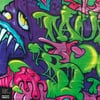
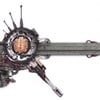
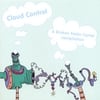
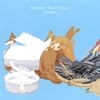
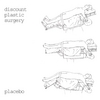
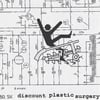
all of those songs are crazy boring to me. you should just bring a ghettoblaster to class and bump track 2 form confeld and be all like "what."
ReplyDeletemost influential new instrument of the 20th century? i think it's the recording (pick your format). it shifted our fundamental interest in music from the interaction between intervals to timbre.
oh, but if you need a conventional instrument, i would just go all out and use the 808. boom tik tik tik.
I agree with Mr. Hunnicutt on this one. Things didn't get interesting until Detroit came along. I admire those mid-century guys for wanting to push things in a new direction, but there's just no soul to that sort of stuff.
ReplyDeletePersonally, I'm more interested in the way electronic music has progressed in the past 30 years. In my opinion, no other form of music has mutated into so many styles in such a short amount of time.
And the most influential instrument is a toss-up between hoovers and reeces.
The most influential? Recording for sure (magnetic tape especially, allow many individuals to record shit, lead to multitracking and those dope Maxell XL-II's I used to make mixtapes on). I wanted to say helicopter, but . . . the computer, in most cases, seems to build on a previous idea or innovation, and while in many cases it does it easier and better, it still isn't earth shattering. You have been able to cut good records for a long time before PCM came along. Computers took an already good idea and process, recording, and fixed many of the issues that folks dealt with in the studio (see bad singers, see editing).
ReplyDeleteSometimes music needs to be written or experimented with in the early stages to even open up the door for shit like Detriot to hit. The synths and recording rigs of the early days were fucking huge room like structures, and only the geeks and scientist were even messing with this stuff. Then the artzy fucks got a hold of it, breaking the barrier of from science into art. Pop embraces the innovation after it is accepted by artzy fuck music (I don't like this term, but classical doesn't really seem to apply, but artzy fuck music=music that yuppies got to museums and concert halls to see but goes way outside the box).
Just because you don't have soul doesn't mean that you can not create soul for other people, see Bob Moog, ultra L33T, and look at the soul he was able to inspire in people.
I can go on for a long time about this shit, and I will soon.
i agree that "recording" has shaped a lot of things and influenced the way we experience sound but isn't there a lot more that's been done with computers? access, processing power, the ability to generate new sounds, etc. not to mention (the internet) making music widely available to everyone, the ability to collaborate with others, hmm...what else.
ReplyDelete808's are definitely a very influential instrument but the scope of music in the 20th century ranges much further than techno and hip-hop.
of course, given the contex, this is a different conversation than the one i will be having in the morning with my classically oriented class mates.
we were born before computers with any processing power were widely available, so we've got a good perspective on where home computers started to take up music(read: amiga .sid .mod chip tunes) and what we've accomplished with them so far...a vast field, wait till those little fuckers who grew up having mac books get their chops, i think there's a lot more to come.
my initial thought would have been "magnetic tape" which shows up in the first quartersecond of reading the comments on this post so yeah. magnetic tape. but you derailed us with the lectronic moniker. absolutely more fundamental than that: guitar, duh.
ReplyDelete20th century = guitar century. the fucking fury has been unleashed.
"the fury" makes me laugh. seems like you guys are pretty set on this tape thing.
ReplyDeleteQuoting from the Wiki-know-it-all- "Magnetic tape was first used to record computer data in 1951 on the Eckert-Mauchly UNIVAC I." So, magnetic tape is an important part of the computer revolution you see as more fury filled than boring old tape. Suckka
ReplyDeletewell i'm sitting here in class and its apparent by consensus of the class that, yes, recording is the most influential technology of the latter half of the 20th century...close second, vacuum tubes.
ReplyDeleteVacuum tubes over transistors? It seems like the the scaling down of audio equipment due to the implementation of transistors and integrated circuits has had a far more profound effect on the way most people experience music today.
ReplyDeleteWell, I was gonna suggest a completely different angle- the theremin, for bringing electronic music out of academia and into popular consciousness via sci-fi b-movie scores. The thematic thrust of much influential electronic music since then (w/admittedly more of a pop emphasis), Model 500's "No U.F.O.s," Kraftwerk's nearly entire catalog, stupid jester-hat gray aliens in old rave promotional art, Daft Punk's robot masks, even Chris Cunningham's particular visualizations of otherwise fairly non-referential (read, non-"I-want-your-soul") songs, has remained science-fictional/(in multiple senses) futuristic. I realize this seems like kind of a conflation of genre and medium, and is kind of beside the point with regard to the impact of some of the other technologies you guys have mentioned, but I think it's precisely that conflation that has given music relying heavily on electronic instrumentation any kind of toehold in popular culture. So really, my most problematic assumption here is probably that popularity=influence... what was I talking about, again?
ReplyDelete